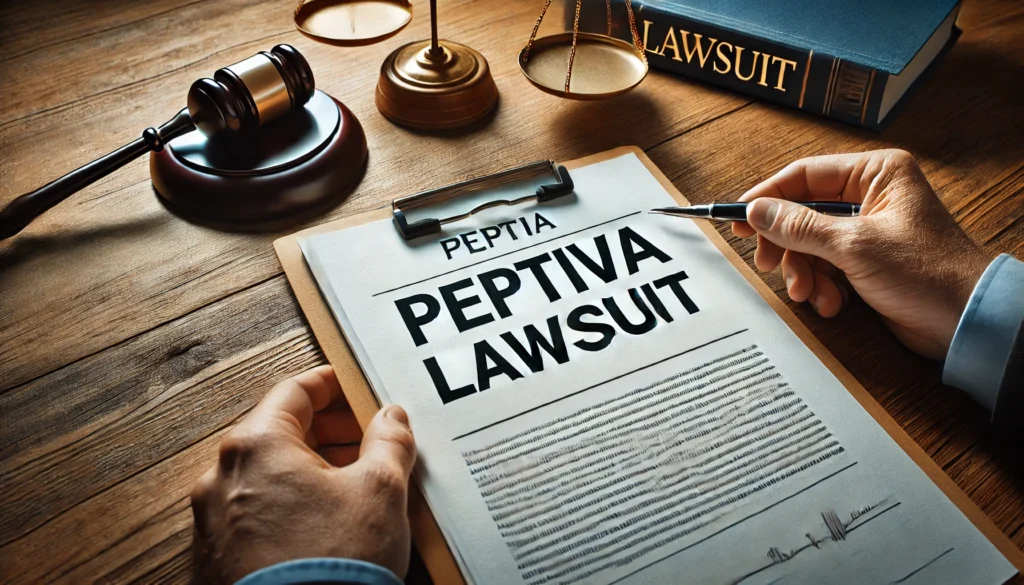Peptiva, a company offering probiotic supplements, has recently found itself at the center of a significant legal battle. Consumers have filed a class action lawsuit against the company, accusing it of false advertising and deceptive billing practices. This article will provide an in-depth yet easy-to-understand overview of the Peptiva lawsuit, covering the core allegations, timeline, and potential outcomes of the case.
What is the Peptiva Lawsuit About?
Peptiva is a health supplement company that markets its probiotics as beneficial for improving digestive health, enhancing sleep quality, and boosting overall well-being. The company uses online marketing strategies, including “free trial” offers, to promote its products. However, a growing number of consumers have voiced concerns about the company’s business practices, leading to the current lawsuit.
The central issues in the lawsuit can be broken down into two major categories:
False Advertising
Consumers have claimed that Peptiva’s advertisements made exaggerated or unproven health claims about its products. Specifically, the company is accused of promising significant health benefits, such as improved sleep and digestive health, without providing sufficient scientific evidence to support these claims.
The problem lies in the fact that many customers expected to experience the advertised benefits after using the product but found that the probiotics did not live up to the promises made in the marketing materials.
Deceptive Billing Practices
Another significant allegation against Peptiva is its billing practices, particularly concerning its free trial offers. According to the lawsuit, customers who signed up for a free trial were unknowingly enrolled in subscription plans that included recurring charges. Consumers also reported difficulty canceling subscriptions, which led to unexpected fees being charged to their credit cards.
In many cases, these charges were not clearly disclosed during the sign-up process for the free trial, leaving customers frustrated and confused when they received their bills.
Peptiva Lawsuit: A Closer Look at Allegations of Deceptive Practices
The Peptiva lawsuit revolves around serious allegations of false advertising and unfair billing practices by the company, which markets probiotic supplements. Customers have reported that Peptiva’s advertisements made exaggerated claims about the product’s health benefits, such as improving sleep and digestive health, without sufficient evidence to support these promises.
Additionally, the lawsuit focuses on deceptive billing practices related to Peptiva’s “free trial” offers. Many consumers who signed up for a free trial found themselves automatically enrolled in costly subscription services without their explicit consent. These charges were often hidden or not clearly explained during the sign-up process, leading to financial surprises for customers.
The case, now in the legal process, has drawn attention to the need for more transparency and consumer protection in the dietary supplement industry. A trial is scheduled for mid-2024, and the outcome could have significant implications for both Peptiva and the broader health supplement market. If the court rules in favor of the plaintiffs, Peptiva may face penalties, be required to refund affected customers, and change its business practices.
Timeline of Events
The Peptiva lawsuit began in early 2023, when multiple customers started filing complaints regarding the company’s deceptive practices. Here’s a brief timeline of key events:
Early 2023: Initial Complaints
Several consumers began filing complaints after noticing that they were being charged for products they had not explicitly agreed to purchase. These complaints led to a growing number of people coming forward with similar experiences, resulting in the class action lawsuit.
Discovery Phase: Legal Teams Exchange Information
As the lawsuit progressed, both the plaintiffs (the consumers) and the defense team (Peptiva’s legal representatives) entered the discovery phase. This phase is where both parties exchange evidence and information to build their respective cases.
Mid-2024: Scheduled Trial
The trial is currently scheduled for mid-2024. This is when a court will review the evidence presented by both sides and decide whether Peptiva’s business practices were illegal or deceptive. If the trial proceeds as planned, it could set a legal precedent for similar cases in the future.
Legal Issues Involved
The Peptiva lawsuit touches on several important legal issues, primarily involving consumer protection laws and regulations surrounding advertising and billing practices.
False Advertising Laws
The Federal Trade Commission (FTC) regulates marketing practices in the U.S. and has established clear guidelines that companies must follow to prevent misleading advertising. Under these laws, companies must avoid making exaggerated claims about the effectiveness of their products unless they can substantiate these claims with solid evidence.
Peptiva is being accused of violating these advertising laws by promising health benefits without providing scientific proof. The case highlights the importance of transparency and honesty in advertising, particularly when it comes to health-related products.
Unfair Billing Practices
Peptiva’s billing practices are also under scrutiny. Consumer protection laws are in place to ensure that companies do not engage in deceptive billing tactics, such as automatically enrolling customers in subscription services without their explicit consent.
The lawsuit alleges that Peptiva used misleading tactics by enrolling customers in recurring subscription services through “free trial” offers. In some cases, customers were charged for products they never ordered, and many reported difficulty reaching Peptiva’s customer service to resolve the issues.
Consumer Complaints and BBB Involvement
Peptiva’s practices have attracted numerous complaints, many of which center around the company’s billing practices and customer service issues.
Customer Experiences
Numerous consumers have shared their frustration with Peptiva’s business practices. Customers who tried the “free trial” offer often found themselves automatically enrolled in expensive subscription plans without realizing it. These unexpected charges caused financial distress for many, as they had no prior knowledge of the subscription terms.
Furthermore, customers reported difficulties when trying to cancel their subscriptions. Some claimed they were unable to reach customer support, while others felt that the company made the cancellation process deliberately complicated.
Better Business Bureau (BBB) Complaints
The Better Business Bureau (BBB) has received multiple complaints against Peptiva. These complaints further highlight the widespread dissatisfaction with the company’s marketing and billing practices. The BBB has a reputation for tracking business complaints and helping resolve consumer issues, and its involvement underscores the seriousness of the situation for Peptiva.
Class Action Lawsuit
The class action lawsuit allows multiple affected consumers to come together and file a single legal case against Peptiva. This approach can make it easier for consumers to seek justice, as the damages and legal costs are divided among all plaintiffs, and it increases the chance of holding the company accountable for its actions.
Potential Outcomes of the Lawsuit
There are several potential outcomes for the Peptiva lawsuit, each of which could have significant consequences for both the company and the dietary supplement industry as a whole.
Settlement
One possible outcome is that Peptiva may choose to settle the lawsuit out of court. A settlement typically involves the company agreeing to compensate affected customers, adjust its business practices, and make changes to its marketing and billing procedures.
In a settlement, Peptiva may offer refunds to customers who were charged unfairly, stop using misleading advertising techniques, and implement clearer subscription cancellation policies. Settling out of court can save both parties time and money, but it does not provide a public ruling on the company’s conduct.
Court Ruling
If the case goes to trial, the court will examine the evidence presented by both sides. If the court rules in favor of the plaintiffs, Peptiva could face significant financial penalties. The court might order the company to refund customers, stop deceptive advertising, and change its billing practices. A ruling against Peptiva could also result in regulatory scrutiny from government agencies like the FTC, which could impose further penalties or restrictions on the company.
Industry Impact
The outcome of the Peptiva lawsuit could set a legal precedent for other companies in the dietary supplement industry. If Peptiva is found guilty of deceptive practices, other businesses in the health and wellness sector may be forced to adopt stricter advertising and billing standards. This case highlights the growing concern over false advertising and unethical business practices in the supplement industry.
Key Legal Precedents and Related Cases
This lawsuit is part of a broader trend of consumer protection cases in the health and wellness sector.
Previous Lawsuits in the Supplement Industry
Peptiva’s case is not unique. The dietary supplement industry has faced numerous lawsuits over the years related to false advertising, misleading health claims, and deceptive billing practices. These cases have played a critical role in shaping the current legal framework for health product marketing.
FTC Enforcement
The Federal Trade Commission (FTC) is actively involved in regulating marketing and advertising practices, especially those related to health products. The FTC has enforced several cases involving deceptive health claims and misleading business practices, and this Peptiva case could add to its growing body of work in the sector.
Conclusion
The Peptiva lawsuit is an important case that highlights critical issues regarding false advertising, consumer protection, and business ethics. As the legal process unfolds, it could have lasting effects on Peptiva and the broader dietary supplement industry.
Consumers are advised to remain cautious when signing up for free trials or subscription services, especially in industries like health and wellness, where misleading claims and deceptive billing practices can be more common. The outcome of this case will likely influence how companies market their products and how they engage with customers in the future.
Frequently Asked Questions (FAQs)
What is the Peptiva lawsuit about?
The Peptiva lawsuit involves accusations of false advertising and deceptive billing practices related to the company’s probiotic supplements and recurring subscription charges.
How did the lawsuit start?
The lawsuit began after multiple consumers complained about misleading marketing claims and hidden subscription fees tied to Peptiva’s “free trial” offers.
What are the main complaints against Peptiva?
Consumers claim that Peptiva exaggerated the health benefits of its products and enrolled them in recurring charges without proper consent or clear communication.
What is a class action lawsuit?
A class action lawsuit allows multiple consumers who have been similarly affected to file a single legal case together, making it easier to seek justice.
What could happen if Peptiva loses the case?
If Peptiva loses, it could face financial penalties, be required to change its business practices, and provide refunds to affected customers.
Article Recommendations
Armaid Complaint Sony Beverly Slate Lawsuit: Analyzing the Role of Hedge Funds in Hollywood Disputes
Navigating Personal Injury Settlements: Strategies for Maximizing Compensation




